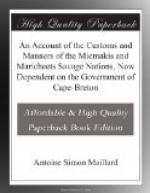They have two distinctions of style; the one noble, or elevated, for grave and important subjects, the other ignoble, or trivial, for familiar or vulgar ones. But this distinction is not so much with them, as with us, marked by a difference of words, but of terminations. Thus, when they are treating of solemn, or weighty matters, they terminate the verb and the noun by another inflexion, than what is used for trivial or common conversation.
I do not know, whether I explain clearly enough to you this so material a point of their elocution; but it makes itself clearly distinguished, when once one comes to understand the language, in which it supplies the place of the most pathetic emphasis, though even that they do not want, nor great expression in their gestures and looks. All their conjugations are regular and distinct.
Yet, with all these advantages of language, the nation itself is extreamly ignorant as to what concerns itself, or its origin, and their traditions are very confused and defective. They know nothing of the first peopling of their country, of which they imagine themselves the Aborigines. They often talk of their ancestors, but have nothing to say of them that is not vague or general. According to them, they were all great hunters, great wood-rangers, expert managers of canoes, intrepid warriors, that took to wives as many as they could maintain by hunting. They had too a custom amongst them, that if a woman grew pregnant whilst she was sucking a child, they obliged her to use means for procuring an abortion, in favor of the first-come, who they supposed would otherwise be defrauded of his due nourishment. Most of them also value themselves on being descended from their Jugglers, who are a sort of men that pretend to foretel futurity by a thousand ridiculous contorsions and grimaces, and by frightful and long-winded howlings.
The great secret of these Jugglers consists in having a great Oorakin full of water, from any river in which it was known there were beaver-huts. Then he takes a certain number of circular turns round this Oorakin, as it stands on the ground, pronouncing all the time with a low voice, a kind of gibberish of broken words, unintelligible to the assistants, and most probably so to himself, but which those, on whom he means to impose, believe very efficacious. After this he draws near to the bowl, and bending very low, or rather lying over it, looks at himself in it as in a glass. If he sees the water in the least muddy, or unsettled, he recovers his erect posture, and begins his rounds again, till he finds the water as clear as he could wish it for his purpose, and then he pronounces over it his magic words. If after having repeated them twice or thrice, he does not find the question proposed to him resolved by this inspection of the water, nor the wonders he wants operated by it, he says with a loud voice and a grave tone, that the Manitoo, or Miewndoo,




